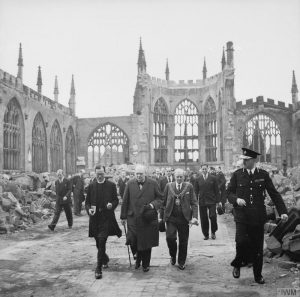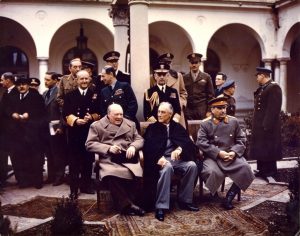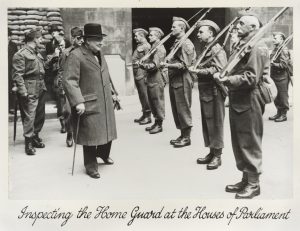
Finest Hour 170
“Flying in a Hurricane”: Churchill and Lawrence Shape the Middle East
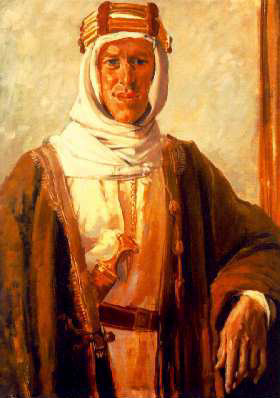
December 3, 2015
Finest Hour 170, Fall 2015
Page 28
By Warren Dockter
Warren Dockter is a Research Fellow at Clare Hall, Cambridge, and the author of Churchill and the Islamic World, reviewed on page 36.

Few friendships shaped history as much as that between Winston Churchill and T. E. Lawrence. In Great Contemporaries, Churchill reminded his readers that Lawrence “flew best and easiest in the hurricane.” The same might be said of Churchill.1 Both were men of genius littered with paradoxes; both had an unyielding sense of justice; and both were products of the British Empire. Churchill admired Lawrence as a sort of Napoleon and undoubtedly saw traces of himself in Lawrence. Both men were early enthusiasts of air power, and both enjoyed not only making history but writing it. This helps explain the nature of what might appear to have been an unlikely friendship, especially after their first meeting in Paris during the 1919 Peace Conference.
The two were both attending a luncheon when Churchill was told a story about Lawrence refusing honours to be bestowed upon him by King George V. Churchill’s impression was that Lawrence, wishing to make a political statement, declined the honours during an official public ceremony. Churchill was outraged and quickly rebuked Lawrence, calling his actions “most wrong.”2 Only later did Churchill learn that Lawrence had refused the honours in a private reception with the King in order to demonstrate that “the honour of Great Britain was at stake in the faithful treatment of the Arabs and that their betrayal to the Syrian demands of France would be an indelible blot on our history.” Lawrence’s cool demeanour and “good humour” regarding the incident stood out in Churchill’s mind.3
By 1919 it had become apparent that Britain’s antiquated and chaotic system of colonial governance (split between the Colonial Office, Foreign Office, and India Office) was not capable of creating a coherent Middle East policy. The most glaring example of deficiency resulted from three important promises made during the First World War, each of which proposed seemingly different arrangements for the post-war Middle East. The Hussein-McMahon pledges made in 1915 and 1916 supported Arab national aspirations, which Lawrence defended at the Paris Peace Conference. The 1916 Sykes-Picot Agreement proposed splitting the remains of the Ottoman Empire between France and Britain. Further complicating the situation, the 1917 Balfour Declaration stated that Britain would work toward establishing a national home for the Jewish people in Palestine. Churchill was appointed Colonial Secretary in early 1921 to find a solution to this tangled and embarrassing fiasco.
Churchill wholeheartedly flung himself into the task of creating a new Middle East Department. He enlisted a host of experts on Middle Eastern affairs, including John Shuckburgh as Department Head and Major Hubert Young as his Assistant Secretary. Both men were sympathetic to the Arab cause. However, Churchill’s adviser on military affairs in the Middle East, Colonel Richard Meinertzhagen, was a fierce Zionist who frequently butted heads with Lawrence. Remembering Lawrence’s passion for Arab national aspirations and his willingness to sacrifice his own career to bring the matter before the King, Churchill immediately set on Lawrence to be his special adviser on Arabian Affairs, despite apprehension from colonial officials, who feared that Lawrence’s temperament was unsuitable for public office and asked Churchill, “wilt thou bridle the wild ass of the desert?”4

2024 International Churchill Conference
Bringing Lawrence into the department began an enduring friendship with Churchill, which had long-term effects on British policy in the Islamic world. Among the things they discussed in their first official meeting in January 1921 was Lawrence’s support of Prince Feisal, a son of King Hussein of Mecca, in his designs for Mesopotamia. As they were discussing possibilities for the region, Lawrence pointed out to Churchill that if the British supported Feisal, it would “tend towards cheapness and speed of settlement.”5 Churchill concurred.
With his new Middle East department set up, Churchill swiftly called for a conference in Cairo to determine how exactly Britain might administer the region in a cost-effective manner. The Cairo Conference opened on 12 March 1921 at the Semiramis Hotel. It was attended by “some 40 British experts from London and the Middle East,” including A. T. Wilson from Persia, the high commissioners Percy Cox (Mesopotamia) and Herbert Samuel (Palestine), T. E. Lawrence, Gertrude Bell (Cox’s oriental secretary and the only woman among the delegates), as well as several representatives of Somaliland and Aden.6 This conference decided to structure the region on what Churchill called the “Sherifian solution,” which vested power with the Hashemite family and its patriarch King Hussein. This ensured that King Hussein would be King of the Hejaz and would be based in Mecca. It placed his son Feisal on the throne of Iraq and his son Abdullah on the throne of Jordan.
Beyond Lawrence’s ability to find solutions, Churchill’s relationship with him was characterized by “deep mutual admiration and respect.” “Lawrence’s influence on Churchill was considerable,” resulting in “Churchill’s adherence to Lawrence’s recommendations even on issues [with] which the rest of the Middle East Department dissented.”7 Meinertzhagen recorded in his diary that he was “struck by the attitude of Winston towards Lawrence, which almost amounted to hero worship.”8 Churchill’s admiration of Lawrence became a thorn in the side of Meinertzhagen, because Lawrence typically steered Churchill towards Arab sympathies. As a result, Lawrence and Meinertzhagen became rivals for Churchill’s attention and mouthpieces for the opposing Arab and Zionist causes in the Middle East. Usually, Lawrence won out.
Churchill’s admiration for Lawrence might be explained by his similarities to Churchill’s old friend and well-known Arab sympathizer Wilfrid S. Blunt. In some ways, Lawrence was a “caricature” of Blunt.9 Churchill even arranged a meeting of his two greatest influences in Islamic and oriental matters in early 1922. Whatever the cause of Churchill’s admiration for Lawrence, he sometimes trusted Lawrence’s positions on the Middle East to a fault. For instance, Lawrence pushed heavily for Feisal to become the sovereign in Iraq, despite Feisal’s Sunni faith clashing with the predominantly Shia population he aspired to rule. While Percy Cox and Gertrude Bell also supported Feisal, it was Lawrence’s reports (Feisal “behaved like a real gentleman and with a fine sense of honour and loyalty” and was “the best possible one for us in the present circumstance”10) that led Churchill to believe “Lawrence’s thesis that Britain owed a great deal to Feisal and his followers.”11 Moreover, it was Lawrence who pushed British favour away from Feisal’s brother Abdullah, whom Lawrence depicted as “lazy and by no means dominating.”12
Perhaps more insidiously, Churchill absorbed negative notions about Palestinian Arabs from Lawrence, who went so far as to characterize them as “stupid, materialistic, and bankrupt.”13 This most likely came from the belief that Palestinian Arabs were loyal to the Ottoman Empire in the First World War, while the Bedouin Arabs allied with Britain. The reality, however, was that most Arabs overwhelmingly supported the Ottoman Empire, with the exception of those associated with Feisal’s Hashemites. Despite this, anti-Palestinian feeling was commonplace among Lawrence’s allies such as Feisal, who was “contemptuous of the Palestinian Arabs” and did not “even regard them as Arabs.”14
At the Cairo Conference, Lawrence also worked to create an independent Kurdistan, because he felt the Kurds should not be under Arab rule. In doing so he broke ranks with Percy Cox and Gertrude Bell, who thought the proposed area “formed an integral part of Iraq” and should be kept in a united Iraq.15 As a result, Bell, who felt Lawrence was becoming unruly, called Lawrence a “little imp,” at which “his ears and face turned red and he retreated in silence.”16 Churchill agreed with Lawrence because he was fearful that the future ruler might “outwardly accept constitutional procedures [but] at the same time despise democratic and constitutional methods.” In this situation it would prove all too easy for the new king to “ignore Kurdish sentiments and oppress the Kurdish minority.”17
Plans for independent Kurdistan came to nought, however, due to the region not being completely under British control. The new Turkish government led by Mustapha Kemal contested the region in the mountains between the two Zab Rivers west of Arbil, making a Kurdish nation all but impossible. Churchill later came to regard Kemal Atatürk as a “Warrior Prince” and spoke of his quality as a military tactician.18 These and other praises prompted Lawrence to write that he “was glad to see [Churchill] say a decent word about Mustapha Kemal.”19
While in Cairo, Churchill and Lawrence had time to venture out, along with Clementine Churchill, Percy Cox, and Gertrude Bell, to see the pyramids and ride around the Sphinx. Famously, Churchill fell off his camel. According to Gertrude Bell, he looked like “a mass of sliding gelatin.”20 Clementine laughed, “How the mighty had fallen.”21 Churchill barked back that he had “started on a camel and…would finish on a camel.”22 Far from being embarrassed, Churchill kept a copy of the story clipped from the local paper, Palestine Weekly, which noted the incident and concluded by saying that he and “Col Lawrence camelled back to Mena House.”23 Much to Churchill’s appreciation, it was reported that he did indeed finish on a camel.
From Cairo, Churchill and Lawrence went to Jerusalem to finish the puzzle by finding a place for Abdullah. Their solution was to partition Palestine. The lands west of the Jordan River would remain under British control through a League of Nations Mandate. East of the Jordan, Transjordan (later simply Jordan) would become Abdullah’s kingdom. Lawrence was cautious about Abdullah as ruler there, fearing the French might dangle the throne of Damascus toward Abdullah to bring Transjordan into the French orbit. However, Churchill remained steadfast. He believed that “a Sherifian candidate was essential. To support Feisal in Mesopotamia, but to refuse to support his brother in Trans-Jordan would be courting trouble.” Churchill wanted to “adopt a [Jordanian] policy…which would harmonize with our Mesopotamian policy.”24 Lawrence quickly reversed his position, in part because he supported an overall Sherifian solution to the Middle East, as Churchill suggested, but mostly because he believed that “neither Britain nor Amir Abdullah were strong enough at present to hold Transjordan without the assistance from the other.”25
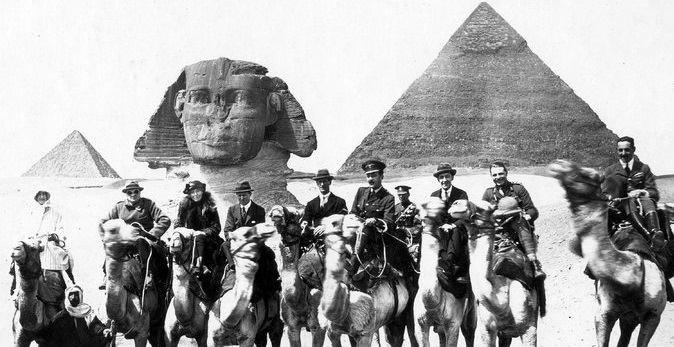
After restructuring the Middle East, Lawrence and Churchill saw less of one another. However, they still shared their thoughts and literary accomplishments. Churchill shared his memoirs of the First World War, The World Crisis, with Lawrence, who thought it was a masterpiece and praised Churchill as a writer and a historian. While Churchill admired and respected Lawrence, he was in awe of his writing. Lawrence’s account of the Arab revolt, Seven Pillars of Wisdom, Churchill believed, “ranks with the greatest books ever written in the English language,” not least because it said that “Mr. Winston Churchill…was entrusted… with the settlement of the Middle East; and in a few weeks, at his conference in Cairo, he made straight all the tangle, finding solutions fulfilling…our promises in letter and spirit.”26 But Churchill also recognised the limits of Lawrence’s work. He confided in his old age to Anthony Montague Browne that while Seven Pillars of Wisdom was “a remarkable work,” Lawrence was a “stylist” and Seven Pillars could not be read as factual history.27 But this did not matter to Churchill. The legend of Lawrence of Arabia was much more important and held much more interest than historical accuracy.
It is no wonder that Churchill encouraged Lawrence to visit him at Chartwell. Lawrence did visit and even helped Churchill lay bricks on his massive wall in the garden. Characteristically, Lawrence “never announced his arrival” and had the ability to steal the conversation even from the great man himself. Sarah Churchill remembered that everyone, even her father, would be quiet and “listen in pin-drop silence to what [Lawrence] had to say.”28
When Lawrence died in a motor-cycle crash in 1935, Churchill was deeply saddened and gave a eulogy at the unveiling of the Lawrence Memorial at Oxford High School. Churchill received several letters, odes, and poems remembering Lawrence. He also participated in raising money for the memorial. Later on, he often recalled his time together with Lawrence. In 1946, when he was questioned about the Middle East in the House of Commons, Churchill remarked that when Lawrence gave him The Seven Pillars of Wisdom, he had written in it that Churchill “had made a happy end to the show.”29
As we know today, that is not entirely accurate. There is certainly no happy end to the show, and the hurricane that engulfed the Middle East one hundred years ago still rages, though winds blow from different directions. What can be said is that Churchill and Lawrence flew in the winds of the hurricane together.
Endnotes
1. Winston Churchill, Great Contemporaries, ed. James W. Muller (Wilmington, DE: ISI Books, 2012), p. 165.
2. Ibid., p. 156.
3. Ibid.
4. Ibid., p. 159.
5. Lawrence to Churchill via Eddie Marsh, 17 January 1921, CHAR/17/14, Churchill Archives Centre, Cambridge.
6. Timothy Paris, Britain, the Hashemites, and Arab Rule: The Sherifian Solution (London: Routledge, 2003), p. 137.
7. Ibid., p. 130.
8. Richard Meinertzhagen, Middle East Diary: 1917–1956 (London: Cresset Press, 1959), p. 33.
9. Kathryn Tidrick, Heart Beguiling Araby: The English Romance with Arabia (Cambridge: Cambridge University Press, 1981), p. 181.
10. Martin Gilbert, ed., Winston S. Churchill (London: Heinemann, 1977), companion vol. IV, part 2, p. 1298.
11. David Fromkin, A Peace to End All Peace (New York: Henry Holt, 1989), p. 499.
12. Aaron Klieman, Foundations of British Foreign Policy in the Arab World: The Cairo Conference of 1921 (Baltimore: Johns Hopkins Press, 1970), p. 107.
13. Bernard Wasserstein, The British in Palestine: The Mandatory Government and the Arab-Jewish Conflict, 1917–29 (London: Blackwell, 1991), p. 13.
14. Jehuda Reinharz, Chaim Weizmann: The Making of a Statesman (Oxford: Oxford University Press, 1968), pp. 255–56.
15. Klieman, p. 110.
16. Janet Wallach, Desert Queen: The Extraordinary Life of Gertrude Bell (London: Weidenfeld and Nicholson, 1996), p. 299. See also Reader Bullard, The Camels Must Go (London: Faber, 1961), pp. 121–22.
17. Winston Churchill to Political Committee, 15 March 1921, FO/371/6343, pp. 60–61, Foreign Office Records, National Archives, London.
18. Winston S. Churchill, The Aftermath (London: Thornton Butterworth, 1929), pp. 368, 410.
19. Martin Gilbert, ed., Winston S. Churchill (London: Heinemann, 1979), companion vol. V, part 1, p. 1447.
20. Wallach, p. 300.
21. Ibid.
22. Jack Fishman, My Darling Clementine: The Story of Lady Churchill (London: W.H. Allen, 1963), p. 77.
23. Martin Gilbert, In Search of Churchill (London: Harper Collins, 1994), p. 71.
24. Winston Churchill to the Joint Political and Military meeting on Palestine, 17 March 1921, FO/371/6343, p. 98, Foreign Office Records; Martin Gilbert, Winston S. Churchill (London: Heinemann, 1975), vol. IV, p. 553.
25. Klieman, p. 117.
26. Churchill, Great Contemporaries, p. 161; T. E. Lawrence, The Seven Pillars of Wisdom (New York: Anchor Books, 1991), p. 276 n. 1.
27. Anthony Montague Browne, Long Sunset: Memoirs of Winston Churchill’s Last Private Secretary (London: Cassell, 1995), pp. 201–02.
28. Gilbert, In Search of Churchill, p. 305.
29. Robert Rhodes James, ed., Winston S. Churchill: His Complete Speeches, 8 vols. (New York: Chelsea House, 1974), vol. VII, p. 7374.
Subscribe
WANT MORE?
Get the Churchill Bulletin delivered to your inbox once a month.
